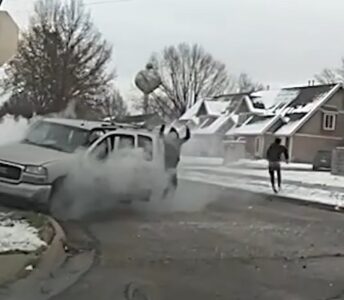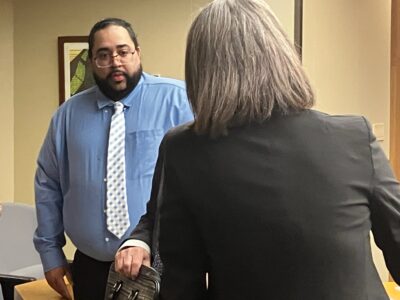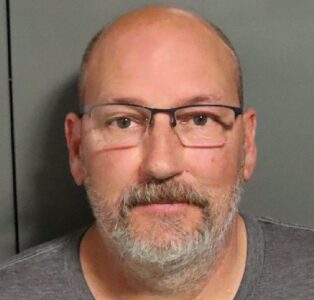Child abuse pediatrician says baby died from injuries, not natural causes; detective grilled over investigation
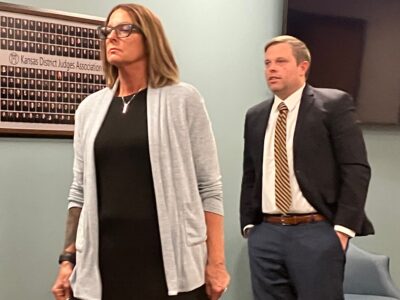
photo by: Kim Callahan/Journal-World
Carrody Buchhorn and her attorney, Quentin Templeton, are pictured Wednesday, Nov. 12, 2025, at Buchhorn's wrongful conviction trial in Douglas County District Court.
Child abuse is what killed a 9-month-old boy at a Eudora day care, not natural causes, according to a child abuse pediatrician who testified Wednesday at the wrongful conviction trial of Carrody Buchhorn, a day care worker who was accused of murdering the baby nine years ago.
The opinion of pediatrician Terra Frazier, a witness for the state, directly contradicted the testimony of forensic pathologist Jane Turner, who testified earlier in the trial that Oliver “Ollie” Ortiz had died from natural causes related to a congenital heart defect. Neither doctor personally examined Oliver but based their opinions on a review of various medical reports, photos and other documents and evidence.
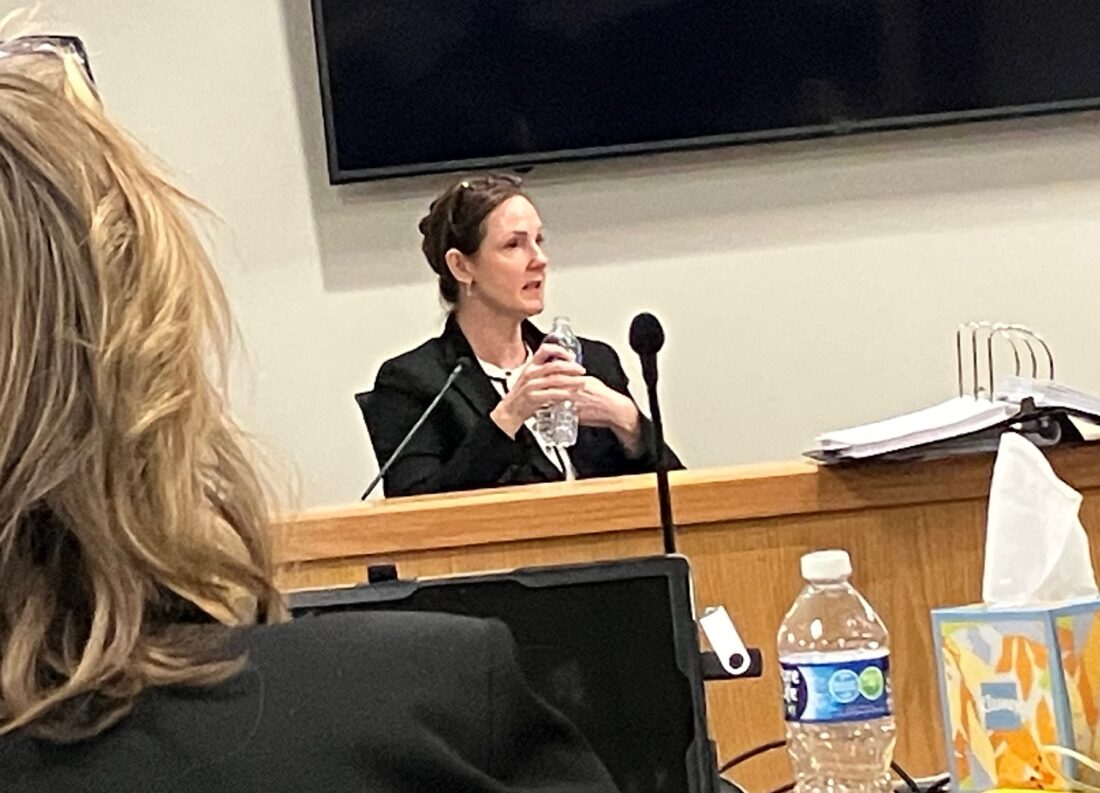
photo by: Kim Callahan/Journal-World
Dr. Terra Frazier testifies Wednesday, Nov. 12, 2025, at the wrongful conviction trial of Carrody Buchhorn in Douglas County District Court.
Turner’s report is what led District Attorney Suzanne Valdez to cease prosecuting Buchhorn in January 2023, although Valdez has said that she did not actually believe in Buchhorn’s innocence.
Buchhorn is seeking compensation from the state and a certificate of innocence for what she says was a wrongful conviction and more than five years in some form of state custody. Her 2018 conviction for second-degree murder was overturned due to ineffective assistance of counsel, and Valdez had vowed to retry her — until she received the report from Turner, whom she herself had hired.
On Wednesday at Buchhorn’s jury-less trial, Frazier told Chief Judge James McCabria that she prepared a report on Dec. 14, 2022, that concluded that Oliver was a victim of child abuse and had suffered a number of traumatic injuries, the “totality” of which ultimately led to his death.
Those injuries, she said, included multiple bruises around the head and scalp, an occipital skull fracture, a carotid sheath hemorrhage, bruising on the chest and in the abdominal activity, a hemorrhage in the diaphragm and the mesentery (the thin tissue that holds internal organs in place), a lacerated liver, a thymus contusion and abrasions on the scalp.
Frazier, under questioning by state’s attorney Mackenzie Baxter, said she did not believe that the majority of those injuries could have come from efforts to revive Oliver via CPR, but she did believe that the ischemic damage to his heart, which Turner had discussed as coming from a heart attack or stroke, could have come from what’s known as “reperfusion” (or blood flow returning to an area) as a result of CPR.
Turner had described Oliver as suffering from a patent foramen ovale (PFO), which is a hole in the wall between the two upper chambers of the heart, which normally closes after birth. The PFO combined with infections, she said, resulted in blood clots, likely causing a fatal heart attack and possibly a stroke.
Frazier, however, testified that PFOs are “very common” and the presence of one did not change her child abuse finding. Nor did she believe that any infections had played a role in Oliver’s death, noting that bacterial contamination can sometimes occur after death.
She did not offer an opinion on the mechanism of abuse — that is, whether the injuries had come from punching or kicking or some other means.
This was in contrast to Dr. Erik Mitchell, the coroner at Buchhorn’s criminal trial, who posited that the injuries had come from blunt force trauma such as Oliver’s head being stomped on. Mitchell testified that Oliver then suffered from “depolarization,” which Buchhorn’s attorneys have aggressively attacked as “junk science” while emphasizing that Mitchell has fallen into disrepute to the degree that Valdez was not even going to use him at a retrial.
Frazier said she never used the word “depolarization” in her report and that she had not relied on Mitchell’s findings in making her own findings, though she and Mitchell both believed traumatic abuse led to Oliver’s death. Buchhorn’s attorneys have claimed in court filings that Frazier’s findings are no different from Mitchell’s.
A point of contention in the trial has been that first responders did not report seeing injuries on Oliver’s body as they tried to resuscitate him at the day care on Sept. 29, 2016, but later at the hospital some injuries were readily apparent, like a “goose egg” on his head and bruising around his ear. Frazier said Oliver’s ashen and mottled skin could have made the bruising more difficult to immediately detect, and the bruises could have become more pronounced over time.
Another point of contention has been whether Oliver’s skull fracture was fresh or several days old. Turner had testified that it was at least several days old and did not contain fresh blood. Frazier was not asked about the issue on Wednesday.
Though Frazier was allowed to testify Wednesday and will return on Thursday, admissibility issues remained regarding her testimony as an expert, which McCabria will settle before rendering a decision.
Oliver’s Eudora pediatrician, Maribeth Orr, also testified Wednesday. She said that Oliver had been a happy and healthy baby who did not have any unusual medical conditions, including cardiac issues, that she had observed during regular wellness checks. Orr had previously worked with Oliver’s mom, who is a nurse, and testified that she had been an attentive mother who would be quick to raise any health concerns.
Earlier in the day, the state called the coroner scene investigator, William Hallagin, who testified about seeing “obvious trauma” on Oliver’s body at the hospital, though he had been told by Buchhorn that no injuries were present earlier. He said he didn’t believe that the injuries were consistent with resuscitation efforts, and he said he alerted a police officer to the inconsistency.
Previously in the trial, several first responders had reported seeing no injuries on Oliver.
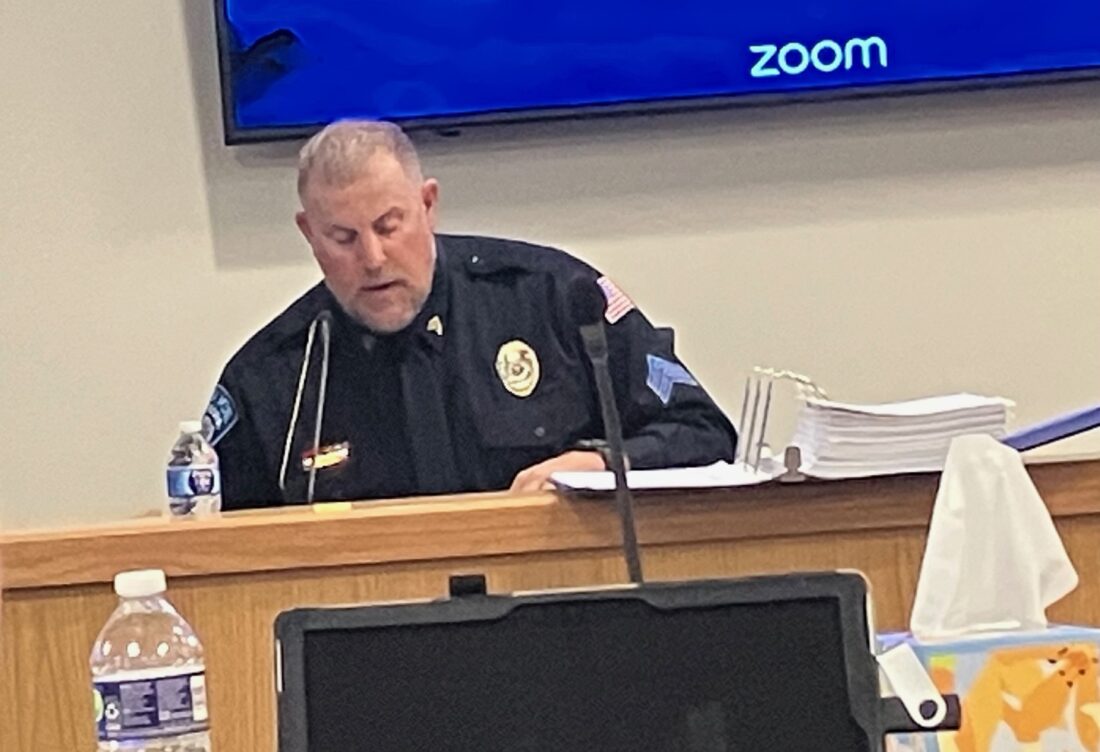
photo by: Kim Callahan/Journal-World
Sgt. Daniel Flick of the Eudora Police Department testifies Wednesday, Nov. 12, 2025, at the wrongful conviction trial of Carrody Buchhorn in Douglas County District Court.
The state on Wednesday also called Sgt. Daniel Flick, who was a detective with the Eudora Police Department at the time and prepared the affidavit supporting Buchhorn’s arrest.
Flick testified that he began doubting Buchhorn’s credibility after she initially said that she and her boss at the day care, Gina Brunton, got along well, but then he discovered numerous text messages where Buchhorn called Brunton derogatory names and seemed frustrated with how little time Brunton spent helping in the day care. Other text messages indicated that Buchhorn had shared intimate and personal items from Brunton’s phone with Buchhorn’s husband.
Flick also testified about finding messages from Buchhorn to her husband that said “Someone’s going to die,” “Going to kill a baby,” “I’m in hell,” and “Ollie is being an (expletive) right now.”
When Valdez called Flick to her office in January 2023 to tell him that she was dropping the case for now because of Turner’s report, he said Valdez said she still believed Buchhorn was guilty. Flick said he was very upset that the prosecution was ceasing.
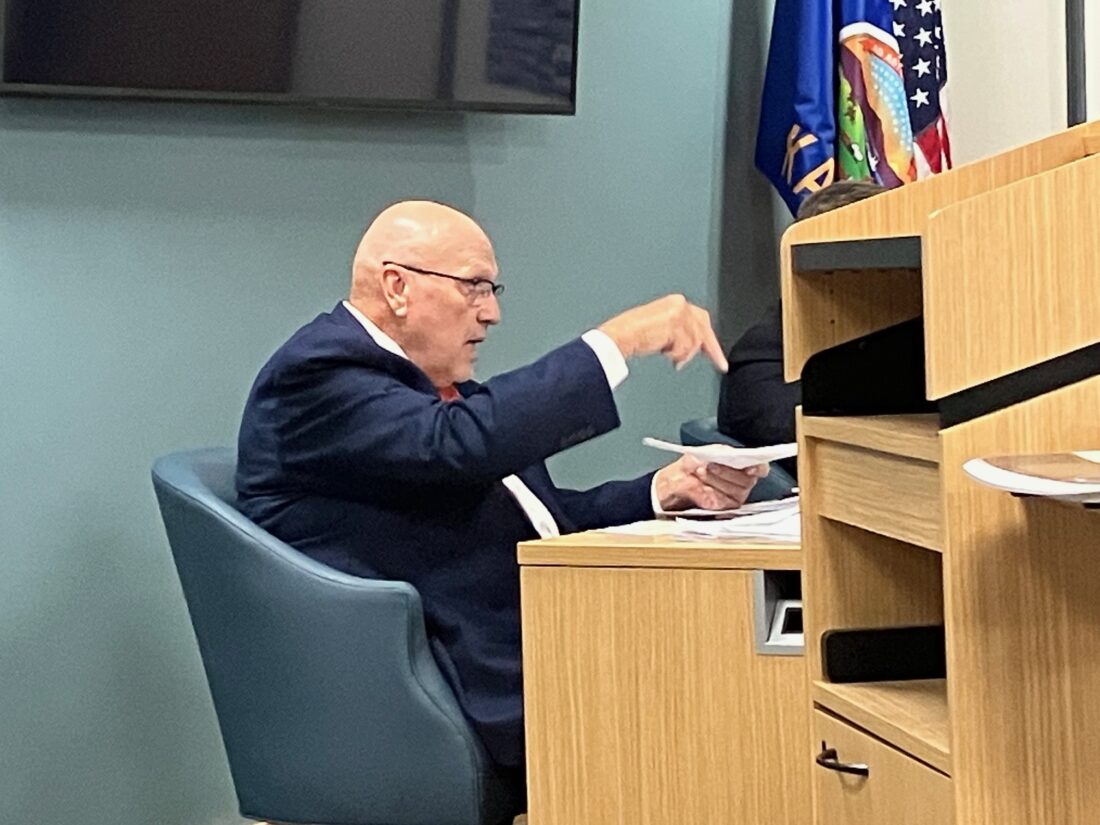
photo by: Kim Callahan/Journal-World
Attorney Bill Skepnek questions a witness Wednesday, Nov. 12, 2025, at the wrongful conviction trial of Carrody Buchhorn in Douglas County District Court.
On cross-examination, Buchhorn’s attorney, Bill Skepnek, grilled Flick at length, suggesting that Flick, who had witnessed Mitchell’s autopsy, had made up his mind prematurely about Buchhorn’s guilt and ignored many other avenues of investigation, such as evidence that Buchhorn had expressed worries to her best friend that something was medically wrong with Oliver in the weeks leading up to his death; evidence that Buchhorn had texted Oliver’s mom with concerns about how he was feeling and how she had been scared two weeks before he died when he had seemed lethargic and limp; and evidence that might be found on Buchhorn’s shoes if they had touched Oliver’s head.
Flick had 35 to 40 witness interviews at his disposal, but only a few witnesses made it into his affidavit — Mitchell being the primary one — Skepnek noted during his questioning. The first responders who saw no sign of injury at the day care were not included in the affidavit.
When asked why he was upset that Valdez had ceased prosecution, Flick said “because I put a lot of time into this case,” prompting Skepnek to ask whether his primary concern should be a search for the truth or his time investment.
When asked by the state’s attorney Gaye Tibbets, though, what the purpose of his affidavit was, Flick said it was simply to summarize the reasons for arrest and was not meant to include everything he and his team had uncovered during the monthslong investigation.
To win her wrongful conviction lawsuit, Buchhorn must prove her innocence to Judge McCabria by a preponderance of the evidence. The trial is expected to conclude on Thursday.


